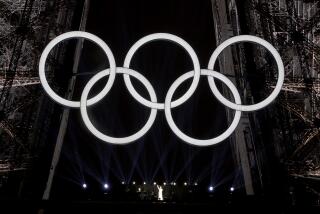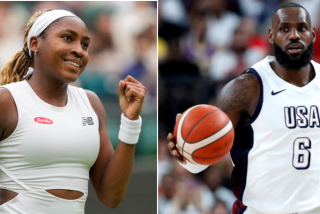Flag Bearer Is Up on Current Events
- Share via
SYDNEY, Australia — The honor of carrying the U.S. flag into Olympic Stadium Friday in the opening ceremony of the 2000 Games was not going to go to Marion Jones, Michael Johnson or Vince Carter.
It is a distinction that belongs more and more not to the most celebrated of the U.S. athletes, but to someone whose story stirs the competitors who march behind.
By a vote of the team captains from each sport Wednesday night, the U.S. team chose kayaker Cliff Meidl of Hawthorne, competing in his second Olympics 14 years after he was nearly killed in a construction accident that sent 30,000 volts coursing through his body and left him with devastating injuries.
“It’s the ultimate for me,” said Meidl, 34, who works as a financial analyst in El Monte and trains at Newport Aquatic Center in Newport Beach. “I’ve seen flag bearers before. I had no idea it would ever be me.”
Debilitated by the burns and serious leg injuries he suffered in a 1986 accident when the jackhammer he was operating struck three unmarked high-voltage cables, Meidl took up canoeing and later kayaking as rehabilitation for a body no longer able to run or play soccer.
Friday, a man whose heart stopped three times after the accident will lead some of the strongest hearts on earth.
“It’s a message, of course, of courage and the indomitable spirit of human beings,” said Anita DeFrantz, an IOC vice president and 1976 bronze medalist in rowing. “He’s not only carrying the flag, he’s carrying the hopes of everyone--not just in the stadium and around the track, but through the competition and onto the medal stand.
“Can you imagine when the rest of the team hears this story? That’s the thing about the Games, you don’t know what other athletes have been through.”
Hammer thrower Lance Deal was chosen as the alternate.
Another nominated was cyclist Lance Armstrong, who has overcome cancer to return to the top of his sport but whose name was withdrawn because he will not be in the country for the opening ceremony.
Also nominated were five-time Olympic basketball player Teresa Edwards and women’s soccer player Brandi Chastain, a symbol of the emergence of women’s sports.
The others nominated: softball player Sheila Douty, equestrienne Karen O’Connor, water polo player Maureen O’Toole, soccer player Carla Overbeck, shooter Kim Rhode, swimmer Dara Torres and rower Mike Wherley.
Wrestler Bruce Baumgartner carried the U.S. flag in Atlanta in 1996, competing in his fourth Olympics at 35 less than a year after close friend and fellow wrestler Dave Schultz had been shot and killed by one-time benefactor John DuPont.
In 1992 in Barcelona, marathoner Francie Larrieu Smith carried the flag as she competed in her fifth Olympics at 39.
In 1988 in Seoul, sprinter Evelyn Ashford carried the flag in her third Olympics, becoming the first black woman to carry the flag for the U.S.
The flag bearer in Los Angeles in 1984 was hammer thrower Edward Burke. .
There are not many bigger Olympic stars than Rafer Johnson, who carried the flag in 1960 when he won the decathlon.
But in recent years, as professionalism has become more the Olympic norm--a suggestion that Magic Johnson carry the flag in 1992 was met with disdain--the athletes have increasingly chosen someone for dedication or perseverance, a sort of lifetime-achievement award.
“This is an incredible honor,” Meidl said.
More to Read
Go beyond the scoreboard
Get the latest on L.A.'s teams in the daily Sports Report newsletter.
You may occasionally receive promotional content from the Los Angeles Times.






